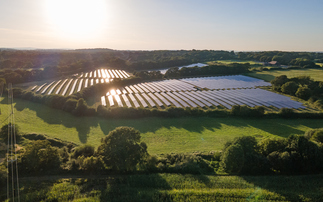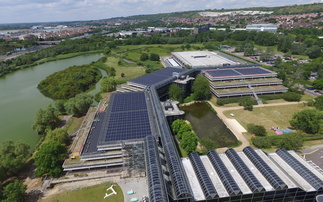Energy and Climate Change Minister says new strategy will provide a major boost to commercial solar rooftop sector
The government's new solar strategy will ensure producing their own energy becomes the "natural default" for companies across the UK, Greg Barker has today predicted.
The Energy and Climate Change Minister today announced a series of measures aimed at boosting the uptake of solar systems on commercial rooftops, as the government works towards meeting its non-binding goal of seeing 20GW of solar energy capacity deployed in the UK by the end of the decade.
The proposed reforms include easing planning requirements for larger systems, working with industry to drive down the cost of solar energy further, and establishing a group within the Cabinet Office to identify sites across the government estate for up to 1GW of solar capacity.
BusinessGreen understands the Department of Energy and Climate Change (DECC) is also working on a new band within the feed-in tariff support scheme for commercial solar rooftop systems that is likely to be announced later this year and would help to make solar arrays on offices, factories, and supermarket roofs more financially attractive.
Jaguar Land Rover, Toyota, and Southend Airport are among the more high-profile solar rooftop systems unveiled in the UK in recent months, but the country is still some distance behind the rates of deployment seen in the US where companies such as IKEA, Walmart, Costco, and Apple have driven the deployment around 3.5GW of commercial solar capacity.
Barker told BusinessGreen there is "massive untapped potential" for solar systems on UK factories, supermarkets, retail parks, and other commercial buildings with an estimated 250,000 hectares of south facing commercial rooftops available.
"If you look at where deployment is we're seeing strong growth in domestic and in large-scale solar arrays, but where we're under-deploying is in mid-sized solar - and that's almost a mirror image of where growth has been in Europe to date," he said. "I want to make on-site generation the natural default for all UK businesses and solar is one of the most obvious technologies for any onsite generation to start with."
The strategy commits the government to working with business to deliver further solar cost reduction, technology and finance innovation, improvements to the supply chain, increased access to skills and training across the industry, and the removal of non-financial barriers to solar deployment.
It is accompanied by a new initiative to encourage the UK's 22,000 schools to fit solar panels and cut a cumulative energy spend of around £500m - a move Barker insisted was much more than "a nice CSR project".
"I want this to be a natural consideration for investment, not just something that the pupils can engage with - although that's very important - but also an integral part of the fabric of British schools," he said. "In exactly the same way as a school would automatically think of investing in heating systems or lighting, they ought to be thinking about generating electricity."
Both moves are to be supported by policy changes. Barker is working with the Department for Communities and Local Government (CLG) to extend permitted development rights in England for building-mounted solar from 50kW to 1MW, with a consultation on the proposal set to be published this summer. The potential for a new support band under feed-in tariffs should also provide a further boost to deployment rates.
The solar industry gave the new strategy a warm welcome today, although concerns remain in some quarters that the shift in focus from solar farms to rooftop arrays could undermine the solar farm market. DECC made little attempt to ease these fears today, with the report suggesting poorly sited solar farms had eroded "the otherwise record levels of public acceptability the solar PV sector as a whole enjoys" and raising concerns that large scale projects had put some pressure on the Levy Control Framework budget.
Friends of the Earth today also warned that without more ambitious policies the government could struggle to achieve its 20GW goal. "It's encouraging to see the Prime Minister's Conservative colleagues promoting a positive solar vision for the UK and as a solution to climate change, particularly when it comes just days after David Cameron took a swipe at onshore wind farms," said Friends of the Earth Executive Director Andy Atkins. "Putting solar on the government estate is a good move, but we need to go further, allowing every community to benefit. As a first step Ministers must relax rules preventing schools borrowing money to install solar, potentially unlocking tens of millions of pounds in savings for schools nationwide."
However, Barker said the government was fully committed to "leading the revolution" in solar power, most notably by installing up to 1GW of solar capacity across the public sector estate. A new solar deployment group has been established in the Cabinet Office under Francis Maude to find sites for panel, as well as other forms of decentralised energy, which could result in panels being fitted on DECC's rooftop in Whitehall - three years after the department cancelled its own flagship solar project following its own cuts to feed-in tariffs. Detailed plans for the first 500MW of public sector installations are now expected to be published by the end of the year.
Barker said the government's commitment to build out solar on its own property showed the seriousness with which the government views the technology, insisting solar has now "come of age" as a commercially viable investment.
"We've now got long-term stability, but most importantly a clear pathway towards grid parity," he said, highlighting the drastic reduction in the cost of solar systems in recent years. "The sooner we can work with the industry to not just reduce, but ultimately eliminate the need for subsidies the better. My ambition for 20GW is clearly predicated on moving to grid parity and once we get that the sky's the limit."









